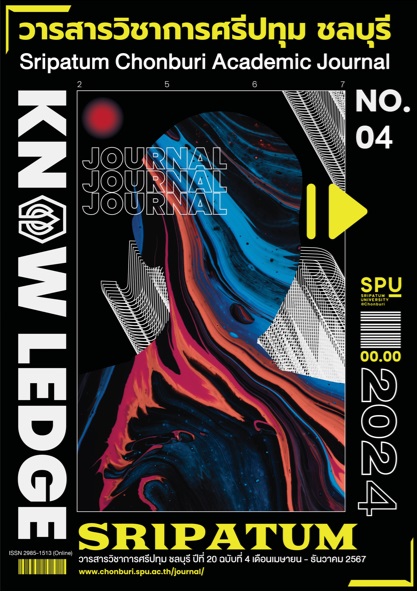A STUDY OF PERCEIVED VALUE AFFECTING THE LOYALTY OF LOW-COST AIRLINEES AMONG THAI PASSENGERS
Keywords:
Perceived Value, Loyalty, Low Cost AirlineAbstract
This quantitative research aimed to study the perceived value affecting the loyalty of low-cost airlines among Thai passengers. The data, gained by a questionnaire, were collected from 400 passengers who traveled with low-cost airline carriers to domestic destinations and were selected by a purposive sampling. Afterwards, data were analyzed by mean, standard deviations, and multiple regression analysis using the Stepwise method. The result revealed that quality value, monetary value, behavioral intentions value, and reputation value affected the loyalty of low-cost airlines among Thai passengers. Consequently, emotional value showed no effect on the loyalty of low-cost airlines among Thai passengers at the statistical significance level of .05.
References
กัลยา วานิชย์บัญชา. (2540). การวิเคราะห์สถิติ : สถิติเพื่อการตัดสินใจ (พิมพ์ครั้งที่ 3). กรุงเทพฯ: โรงพิมพ์แห่งจุฬาลงกรณ์มหาวิทยาลัย.
ท่าอากาศยานไทย. (2566). สถิติขนส่งทางอากาศ (ออนไลน์). เข้าถึงได้จาก: https://investor-th.airportthai.co.th/transport.html [2566, ตุลาคม 29].
สถาบันการบินพลเรือน. (2566). สรุปข้อมูลข่าวสารอุตสาหกรรมการบินของไทย ประจำเดือนเมษายน-มิถุนายน 2566 (ออนไลน์). เข้าถึงได้จาก: https://www.catc.or.th/wp-content/uploads/2021/10/2564_สรุปข่าวการบินเมย-มิย64_ลงเวป.pdf [2566, ตุลาคม 12].
Ashton, A. S., & Scott, N. (2011). Hotel restaurant co-branding: The relationship of perceived brand fit with intention to purchase. Journal of Vacation Marketing, 17(4), pp. 275-285.
Forgas, S., Palau, R., & Sanchez, J. (2012). AIRLINE PASSENGERS PERCEIVED VALUE. International Journal of Management Cases, 14(1), pp. 153-169.
Kartanegara, H. W., & Keni, K. (2022). The effect of customer engagement, perceived value and customer satisfaction towards customer loyalty in the indonesian low-cost airlines industry. In 3rd Tarumanagara International Conference on the Applications of Social Sciences and Humanities (TICASH 2021) (pp. 43-50). Indonesia: the Institute for Higher Education Services Region 3.
Lee, C. K., Yoon, Y. S., & Lee, S. K. (2007). Investigating the relationships among perceived value, satisfaction, and recommendations: The case of the Korean DMZ. Tourism management, 28(1), pp. 204-214.
Lee, J. S., Lee, C. K., & Choi, Y. (2011). Examining the role of emotional and functional values in festival evaluation. Journal of Travel Research, 50(6), pp. 685-696.
Park, J. W., Robertson, R., & Wu, C. L. (2006). Modelling the impact of airline service quality and marketing variables on passengers’ future behavioral intentions. Transportation Planning and Technology, 29(5), pp. 359-381.
Petrick, J. F. (2002). Development of a multi-dimensional scale for measuring the perceived value of a service. Journal of leisure research, 34(2), pp. 119-134.
Verhoef, P. C., Lemon, K. N., Parasuraman, A., Roggeveen, A., Tsiros, M., & Schlesinger, L. A. (2009). Customer experience creation: Determinants, dynamics and management strategies. Journal of retailing, 85(1), pp. 31-41.
Yamane, T. (1973). Statistics: an introductory analysis-3. Florida, FL: University of Florida.
Zeithaml, V. A. (1988). Consumer Perceptions of Price, Quality, and Value: A Means-End Model and Synthesis of Evidence. Journal of Marketing, 52(3), pp. 2–22.
Zeithaml, V. A., Berry, L. L., & Parasuraman, A. (1996). The behavioral consequences of service quality. Journal of marketing, 60(2), pp. 31-46.
Downloads
Published
Issue
Section
License
Copyright (c) 2024 Sripatum University Chonburi Campus

This work is licensed under a Creative Commons Attribution-NonCommercial-NoDerivatives 4.0 International License.
บทความทุกบทความเป็นลิขสิทธิ์ของวารสารวิชาการศรีปทุม ชลบุรี



